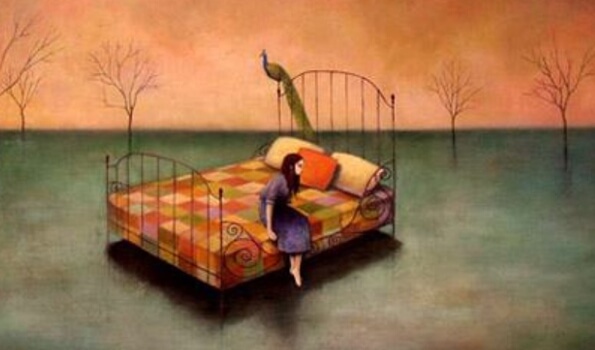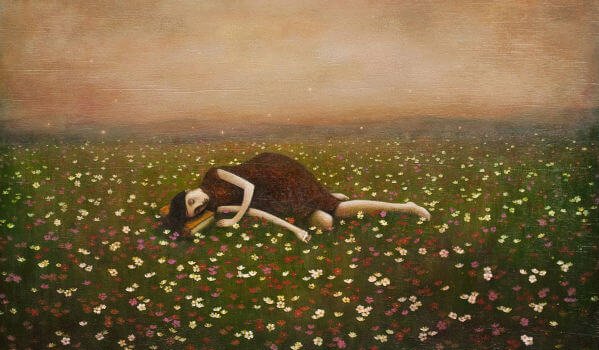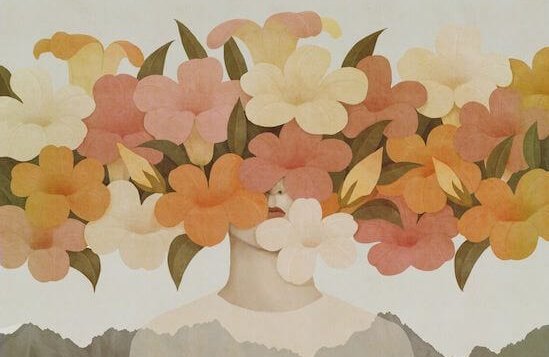Sometimes We Say We're Tired When We're Actually Sad


Written and verified by the psychologist Gema Sánchez Cuevas
Sometimes we feel blue, like life is empty and meaningless. When people ask us what’s wrong we say we’re just tired. That’s all. But under that vague exhaustion there’s sadness.
It’s that gray friend that finds a home in our heart and mind. It moves in without permission and fills us with apathy.
Let’s admit it, we’ve all gone through it at some point. When we feel the gloomy, pervasive emotion of sadness, we go straight to “Dr. Google.” What we’re looking for is a diagnosis. Words like “depression,” “anemia,” “hypothyroidism” show up on the screen.
“Good morning sadness, written into the roof beams. You’re not exactly misery, but the saddest lips announce you with a smile…”
-Paul Éluard-
When sadness finds a home in us, we immediately see it as something wrong. We see it as a disease we need to get rid of soon as possible.
As if we were shaking the dust out of our dirty clothes. We don’t like it and want to defend ourselves from it without stopping to understand it. We don’t dig deeper into its dark nooks where we could find out a lot about ourselves.
We forget that sadness isn’t a disorder. We forget that sadness and depression aren’t the same. As long as this emotion doesn’t last too long or is constantly interfering in our lives, it is actually an opportunity. Paradoxical as it may seem, it’s an opportunity to move forward and grow as people.

We’re always tired, but there may be something underneath
Sometimes we go through phases when we go to bed tired and wake up tired too. We could go to the doctor, but the tests will tell us there’s nothing wrong.
There’s no hormonal imbalance, or iron deficit, or any other biological disease. The doctor will tell us it might just be the change of season. That it’s just a little seasonal affective disorder. Something really minor that can be fixed with a few pills.
Some emotional states don’t require any kind of medical help. But when we experience their psychosomatic effects on our body, we get scared. Then we make the mistake of treating the symptom without dealing with the underlying problem first: sadness.
Why do we feel tired when we’re sad?
The brain mechanisms that control our emotional states are very different from each other. Happiness triggers a whole series of connections and hyperactivity in our cells and brain.
But sadness is much more stripped-down and prefers to ration resources. Still, it does that with a very specific goal in mind. Let’s look at that in more detail.
Sadness generates a very notable decline in energy in our bodies. We also feel the need to avoid socializing. It makes us uncomfortable. Sounds can even hurt. The noise of our environment bothers us, and we prefer a lonely nook.
- One interesting fact is that the structure in charge of this in our brain is the amygdala. But just the right side.
- This small area of our brain is the one that causes our feelings of isolation, inactivity, and physical tiredness… All this lowering of energy has a purpose: to encourage introspection.
So sadness reduces our ability to focus on all the stimuli outside us. It’s like that for a reason. Our brain is trying to tell us it’s time to stop and think. It’s time to reflect on certain aspects of our life.

Things to know about occasional sadness
Occasional sadness, the type that takes over for a few days and makes us feel tired, heavy, and disconnected from reality, deserves some attention.
We can treat the symptoms and fix our tiredness with vitamins, or our headache with painkillers. But it won’t do anything if we don’t get to the real heart of the problem.
“I do not like referring to that sweet, strange feeling that has me obsessed, as sadness”
-Françoise Sagan-
If we don’t, if we don’t stop and look at what’s clouding our mind and making us worry, it may grow. Here are some things to know about sadness. They’ll definitely help us clear up some smaller details.

Three ways sadness can be good
- Sadness is a warning. We mentioned it before: loss of energy, being tired, and trouble concentrating. These are just some of the signs that we have a problem and need to address it.
- Sadness as a result of detachment. Sometimes, our brain is warning us about something our conscious mind still hasn’t noticed. “It’s time to break off that relationship.” “That goal isn’t a good one.” “You’re not happy at work, you’re burning yourself out.. Maybe you should quit…”
- Sadness as a survival instinct. This one is interesting. Sometimes sadness invites us to “hibernate.” It invites us to temporarily disconnect from our life so we can conserve energy. It’s very common, for example, when we experience a big disappointment. If we can, it will be helpful to get away for a few days. This will protect your self-esteem and integrity.
To wrap up, there are times in our life when tiredness isn’t as physical as it is emotional. Instead of seeing sadness as a disorder to treat, we should see it as an internal voice to listen to. We should see it as a valuable, useful emotion we need to grow.
Sometimes we feel blue, like life is empty and meaningless. When people ask us what’s wrong we say we’re just tired. That’s all. But under that vague exhaustion there’s sadness.
It’s that gray friend that finds a home in our heart and mind. It moves in without permission and fills us with apathy.
Let’s admit it, we’ve all gone through it at some point. When we feel the gloomy, pervasive emotion of sadness, we go straight to “Dr. Google.” What we’re looking for is a diagnosis. Words like “depression,” “anemia,” “hypothyroidism” show up on the screen.
“Good morning sadness, written into the roof beams. You’re not exactly misery, but the saddest lips announce you with a smile…”
-Paul Éluard-
When sadness finds a home in us, we immediately see it as something wrong. We see it as a disease we need to get rid of soon as possible.
As if we were shaking the dust out of our dirty clothes. We don’t like it and want to defend ourselves from it without stopping to understand it. We don’t dig deeper into its dark nooks where we could find out a lot about ourselves.
We forget that sadness isn’t a disorder. We forget that sadness and depression aren’t the same. As long as this emotion doesn’t last too long or is constantly interfering in our lives, it is actually an opportunity. Paradoxical as it may seem, it’s an opportunity to move forward and grow as people.

We’re always tired, but there may be something underneath
Sometimes we go through phases when we go to bed tired and wake up tired too. We could go to the doctor, but the tests will tell us there’s nothing wrong.
There’s no hormonal imbalance, or iron deficit, or any other biological disease. The doctor will tell us it might just be the change of season. That it’s just a little seasonal affective disorder. Something really minor that can be fixed with a few pills.
Some emotional states don’t require any kind of medical help. But when we experience their psychosomatic effects on our body, we get scared. Then we make the mistake of treating the symptom without dealing with the underlying problem first: sadness.
Why do we feel tired when we’re sad?
The brain mechanisms that control our emotional states are very different from each other. Happiness triggers a whole series of connections and hyperactivity in our cells and brain.
But sadness is much more stripped-down and prefers to ration resources. Still, it does that with a very specific goal in mind. Let’s look at that in more detail.
Sadness generates a very notable decline in energy in our bodies. We also feel the need to avoid socializing. It makes us uncomfortable. Sounds can even hurt. The noise of our environment bothers us, and we prefer a lonely nook.
- One interesting fact is that the structure in charge of this in our brain is the amygdala. But just the right side.
- This small area of our brain is the one that causes our feelings of isolation, inactivity, and physical tiredness… All this lowering of energy has a purpose: to encourage introspection.
So sadness reduces our ability to focus on all the stimuli outside us. It’s like that for a reason. Our brain is trying to tell us it’s time to stop and think. It’s time to reflect on certain aspects of our life.

Things to know about occasional sadness
Occasional sadness, the type that takes over for a few days and makes us feel tired, heavy, and disconnected from reality, deserves some attention.
We can treat the symptoms and fix our tiredness with vitamins, or our headache with painkillers. But it won’t do anything if we don’t get to the real heart of the problem.
“I do not like referring to that sweet, strange feeling that has me obsessed, as sadness”
-Françoise Sagan-
If we don’t, if we don’t stop and look at what’s clouding our mind and making us worry, it may grow. Here are some things to know about sadness. They’ll definitely help us clear up some smaller details.

Three ways sadness can be good
- Sadness is a warning. We mentioned it before: loss of energy, being tired, and trouble concentrating. These are just some of the signs that we have a problem and need to address it.
- Sadness as a result of detachment. Sometimes, our brain is warning us about something our conscious mind still hasn’t noticed. “It’s time to break off that relationship.” “That goal isn’t a good one.” “You’re not happy at work, you’re burning yourself out.. Maybe you should quit…”
- Sadness as a survival instinct. This one is interesting. Sometimes sadness invites us to “hibernate.” It invites us to temporarily disconnect from our life so we can conserve energy. It’s very common, for example, when we experience a big disappointment. If we can, it will be helpful to get away for a few days. This will protect your self-esteem and integrity.
To wrap up, there are times in our life when tiredness isn’t as physical as it is emotional. Instead of seeing sadness as a disorder to treat, we should see it as an internal voice to listen to. We should see it as a valuable, useful emotion we need to grow.
This text is provided for informational purposes only and does not replace consultation with a professional. If in doubt, consult your specialist.







